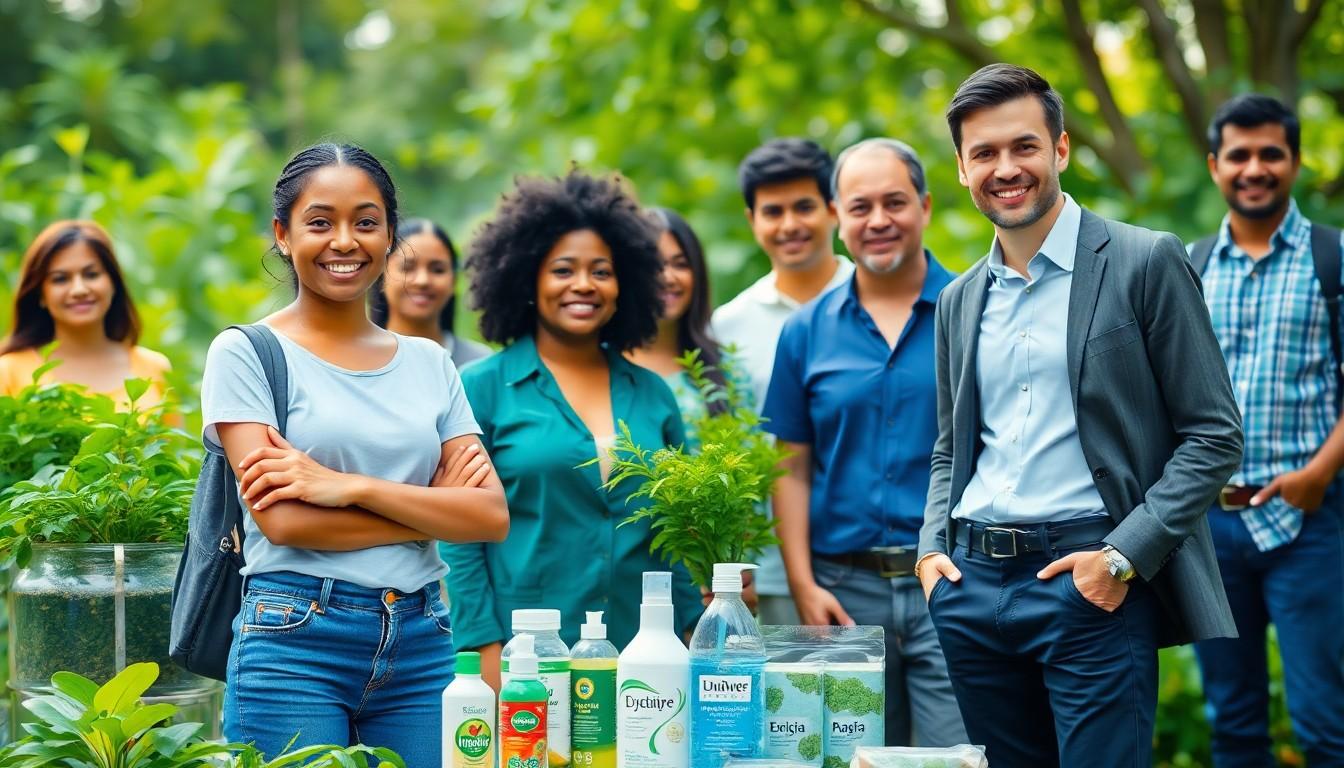Table of Contents
ToggleUnilever’s Sustainable Living Plan is more than just a corporate buzzword; it’s a bold commitment to making the world a better place while keeping our favorite products on the shelves. Imagine a world where your shampoo not only cleans your hair but also helps clean up the planet. Sounds like a dream, right? Well, Unilever is turning that dream into reality, one eco-friendly initiative at a time.
Overview of Unilever Sustainable Living Plan
Unilever’s Sustainable Living Plan aims to make a lasting positive impact on the planet and society. The plan seeks to halve the company’s environmental footprint while increasing the positive social impact of its products. This multifaceted approach aligns with the company’s broader business objectives.
Specific goals include enhancing health and well-being for more than a billion people, reducing water use and waste across operations, and sourcing 100% of agricultural raw materials sustainably. They focus on sustainable sourcing to ensure that ingredients come from responsible suppliers. Furthermore, Unilever commits to providing access to hygiene and nutrition, particularly in underserved communities.
The initiatives cover various brands under the Unilever umbrella, including Dove, Lifebuoy, and Hellmann’s. These brands feature products designed with sustainability in mind, reflecting the company’s core values. For instance, Lifebuoy campaigns promote hand hygiene, which significantly contributes to public health.
Tracking progress is crucial for Unilever. The company reports regularly on its achievements and challenges, sharing data on goals and milestones. Transparency fosters accountability and encourages ongoing improvements. It demonstrates Unilever’s dedication to driving change within the industry.
Previous commitments have provided a foundation for current efforts. Innovations have emerged, such as new biodegradable packaging and reduced carbon footprints through renewable energy. It’s evident that Unilever is reshaping its operations to support a sustainable future for both products and people.
Key Goals of the Plan

Unilever’s Sustainable Living Plan features key goals focused on reducing environmental impact and enhancing social impact. These objectives drive the company’s commitment to sustainability.
Reducing Environmental Impact
Reducing water use and waste ranks among Unilever’s top priorities. The plan targets a 50% reduction in its environmental footprint across the product lifecycle by 2030. Sustainable sourcing of agricultural raw materials is essential; over 70% of Unilever’s key crops are sourced sustainably. Innovative initiatives like biodegradable packaging contribute to minimizing plastic waste, while reducing greenhouse gas emissions aligns with global climate goals. Products developed with eco-friendly practices include shampoo that maintains performance while being gentler on the planet. Regular tracking allows Unilever to measure progress and ensure transparency, reinforcing its commitment to a sustainable future.
Enhancing Social Impact
Health and well-being stand at the forefront of Unilever’s social impact goals. The aim to improve health and hygiene for over one billion people is ambitious yet achievable. Lifebuoy actively promotes hand hygiene education to prevent illness. Investments in community programs support women’s empowerment and improve livelihoods within supply chains. Collaborations with organizations enhance efforts to tackle global challenges. Products like Dove aim to foster self-esteem and promote body positivity among consumers. Regular updates on impacts reinforce Unilever’s accountability and dedication to social responsibility, guiding continuous improvements in practices and policies.
Progress and Achievements
Unilever’s Sustainable Living Plan showcases impressive strides toward enhancing environmental and social aspects. Significant progress aligns with their visionary goals.
Milestones Reached
Targets for a 50% reduction in Unilever’s environmental footprint by 2030 continue to take shape. Over 70% of key crops sourced sustainably mark a crucial achievement. Alternative methods of packaging, including biodegradable options, are increasingly adopted. Efforts in community programs support women’s empowerment and health initiatives, enhancing lives globally. Tracking efforts ensure transparency, confirming dedication to sustainability goals.
Case Studies of Success
Dove exemplifies success in promoting body positivity, empowering consumers through meaningful messages. Lifebuoy’s hand hygiene education programs have significantly impacted public health, reaching millions and reducing illness. Innovative packaging solutions reflect Unilever’s commitment, showcasing eco-friendly designs adopted across various product lines. Collaborations with NGOs provide valuable resources that tackle challenges and enhance supply chains. Overall, these initiatives illustrate the successful implementation of the Sustainable Living Plan.
Challenges and Criticisms
Unilever’s Sustainable Living Plan faces criticism and scrutiny, particularly regarding transparency and accountability. Stakeholders question the clarity and openness of the company’s reporting processes. Some reports reveal gaps in data, leading to skepticism about progress claims. While Unilever regularly shares sustainability updates, critics note inconsistencies in messaging and results, which may hinder trust among consumers and investors. Transparency remains vital for gaining public confidence in its green initiatives. Unilever’s commitment to provide clear information could strengthen its credibility.
Market competition presents another challenge for Unilever. Rival companies increasingly adopt sustainable practices, raising the bar in the industry. Market leaders now seek to differentiate their brands through eco-friendly offerings. For Unilever, maintaining a competitive edge involves continuous innovation and responsiveness to consumer preferences. Failure to adapt may result in lost market share to competitors with more aggressive sustainability strategies. As a result, balancing profit margins with sustainable practices poses an ongoing challenge for the organization.
Future Directions
Unilever plans to intensify its commitment to sustainability through focused strategies. Aiming for a 50% reduction in environmental footprint by 2030, efforts include innovative product lifecycles. Sustainable sourcing continues to be a top priority, with over 70% of key crops already being sourced sustainably.
Innovative approaches, like developing biodegradable packaging, further minimize plastic waste. New product lines will feature eco-friendly designs while maintaining high performance. Collaboration with various NGOs enhances supply chain transparency and addresses pressing global challenges effectively.
Health and hygiene initiatives, led primarily by Lifebuoy, target over one billion people. Promoting hand hygiene education underscores Unilever’s dedication to improving public health. Programs supporting women’s empowerment provide economic opportunities within the supply chain, reinforcing positive community impacts.
Additionally, Dove’s campaigns promote body positivity, addressing social issues while encouraging self-esteem. Regular reporting on goals ensures stakeholders are informed on progress and setbacks. Transparency remains vital for fostering trust and accountability with the public.
Market competition presents ongoing challenges for Unilever. As rival companies adopt similar sustainable practices, the need for continuous innovation becomes critical. Balancing sustainability with profitable growth is essential for long-term success, requiring adaptive strategies aligned with consumer expectations.
Future challenges include improving data clarity in reporting to address stakeholder concerns. Addressing potential skepticism about progress is crucial for maintaining Unilever’s reputation. Prioritizing environmental, social, and economic aspects of sustainability will guide Unilever’s future endeavors.
Unilever’s Sustainable Living Plan represents a bold step towards a more sustainable future. By focusing on reducing its environmental footprint and enhancing social impact, Unilever is setting a benchmark for corporate responsibility. The company’s commitment to innovative solutions like biodegradable packaging and sustainable sourcing showcases its dedication to eco-friendly practices.
As it navigates challenges in transparency and market competition, Unilever remains poised to adapt and evolve. Continued investments in health and hygiene initiatives highlight its role in improving lives globally. With clear goals and regular reporting, Unilever is not just making promises but actively working towards a better tomorrow for people and the planet.







